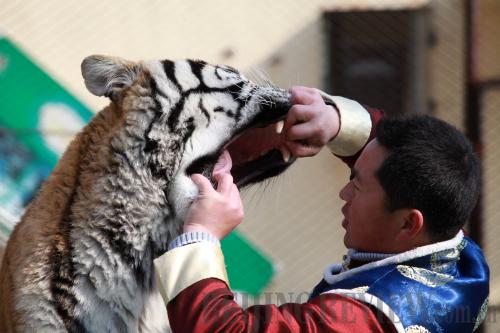|
 |
|
DANGEROUS SHOW: A trainer opens a tiger's mouth during a show in a wildlife zoo in Qingdao, Shandong Province, on January 30 (CFP) |
Their macaque monkeys are nationally protected animals, but the trainers had not applied for a transportation permit.
Animal trainers should first obtain an invitation from a zoo or in places where they plan to perform, and then apply for the license at the local forestry department where they come from, said Zhang Junran, President of the Monkey Art Association in Xinye County.
On January 20, a court in Heilongjiang ruled the four trainers not guilty after a second trial of the case, since they did not harm any of the monkeys.
Yao Yong'an, a lawyer defending the four trainers, said the case sets a legal precedent, and he hopes that monkey trainers will gradually be exempt from a transportation license.
Some trainers, frustrated by the bad experience they had while performing elsewhere, left the business.
"In recent years, the number of monkey trainers has been dropping. In some villages, 85 percent of the residents used to be in the business, while now the percentage dropped below 20 percent," Zhang told Xinhua News Agency.
Animal rights advocacy
Animal entertainment was put under public scrutiny as animal right activists rise. Mang Ping, a professor with the Central Institute of Socialist Studies in Beijing, has been investigating animal welfare in zoos since 2003.
To animal rights activists, circuses are animal abuse. They argue that animals are tamed with "physical and psychological pain, including isolation, starvation, beating and being chained up in small enclosures."
Animal rights activists pushed for an animal protection law to tackle problems such as animal abuse and abandonment. In September 2009, a draft prepared by a number of Chinese law experts was released to solicit public opinions.
Feedback on the draft was mixed. Some residents cannot accept the concept of animal welfare, said Chang Jiwen, the lead drafter of the act and a research fellow with the Institute of Law, Chinese Academy of Social Sciences. They thought currently, the top priority is to protect human welfare, he said.
The draft act was shelved at the national legislature, while in 2010, the forestry administration issued a circular banning dangerous wild animal performances and the Ministry of Housing and Urban Construction prohibited animal performances in zoos.
From 2011 to 2012, professor Mang and a group of students investigated more than 40 zoos across the nation, and found that animal performances were still staged in half of public-owned zoos and around 90 percent of aquariums and wild animal zoos, which are usually privately owned.
Mang's group and other charities in this area, such as the Beijing-based Green Beagle Institute, continued to press for a complete ban on animal performances.
Their calls are not supported by everyone. Shu Shengxiang, a resident of Changde in central China's Hunan Province, believes that regulating animal training and performances is better than a total ban on animal performances. Such performances give children an opportunity to learn about and love animals, he said.
Under pressure from animal protection activists, the circus industry is reforming programs featuring animals and animal training practices.
For instance, for the tiger jumping through fire hoop program, the Great Wall Circus has replaced fire with flowers around the hoop. Dangerous performances such as wrestling between a person and a tiger have also been dropped from the program.
Now in Suzhou's Yongqiao District, villagers usually use food to tempt animals to perform rather than resorting to physical punishment, according to Anhui Daily.
In Gengjia Village in Taogou Township, Yin Along held up pieces of pumpkin to entice a four-month old bear cub to stand up on its back legs. He said that fostering an affinity with animals is more effective than punishing them.
Email us at: wanghairong@bjreview.com | 